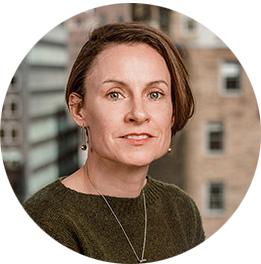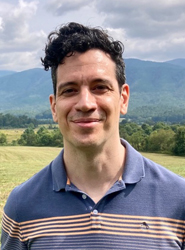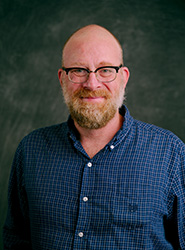A background in English has been a key to this CEO’s competitive edge.
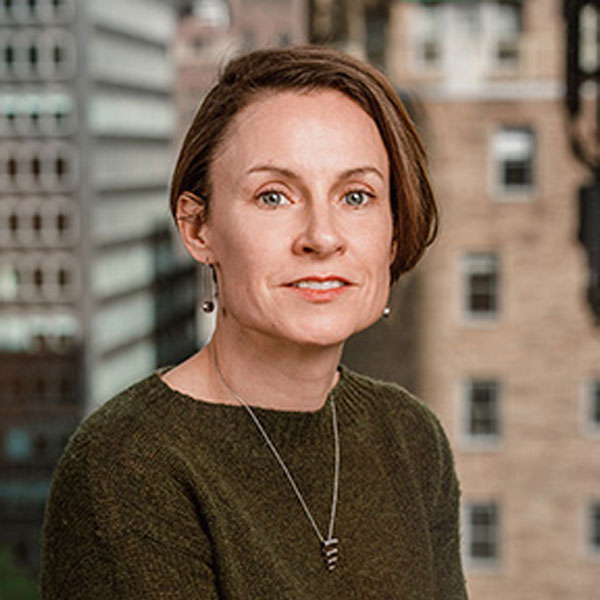
Camille Renshaw, UT English ’94, is CEO of B+E Real Estate, the first brokerage firm to offer an online trading platform for 1031 exchanges and net lease real estate. B+E has offices in 7 cities – NYC, Chicago, San Francisco, Denver, Atlanta, Charlotte, and Tampa. In 2019, B+E set the record for the largest commercial real estate transaction sold by a digital platform, a $324M portfolio. CREW National Network awarded her the “2020 Entrepreneurial Spirit Award,” and Commercial Property Executive awarded her both “2020 Innovator of the Year” and “2020 Net Lease Property Executive of the Year” honors. While she was a student at UT, she worked at the Department of Molecular Spectroscopy and she loved camping in the Smokeys and hiking the Appalachian Trail. She loved her English classes, especially those she took with Dr. La Vinia Jennings, whom she regards as a crucial early mentor and with whom she still maintains a friendship. After graduation, Camille completed an MFA in Writing from Bennington College where she deepened her love of storytelling. Today her training as an English major and storyteller help her lead Fintech companies. She graciously made time for an interview with department Head Misty Anderson as a way to share her success story with current students.
Anderson: Going back to your time at UT, did you know that you were going to major in English?
Renshaw: I did plan on that. I was a double major in English Lit and Political Science. While not part of my formal degree, I was incredibly interested in Computer Science, and that’s where I did my work study. I was working in the Department of Molecular Spectroscopy, but I thought I was going to be a lawyer. My father coached me at that time that law was the best career choice for a southern woman who was bright. I have a lot of great lawyers in my life, don’t get me wrong, but thank God I did not strictly follow that advice.
I would say I have a lot of incongruent interests. I had no idea that I would ever be employable, because the kinds of things that interest me didn’t go together, and I didn’t have any role models. There were no women in technology. And I didn’t know any women in commercial real estate. While my family had been very involved with real estate from a farming perspective, they are good stories, but all of the people involved were men. So I had to figure out how the world of English, Literature in particular, and political science, go together with computers. How do you make a career and a life out of that? I did not know then, and I certainly could have barely imagined my life now.
Anderson: So if you had to make the connection for a current English major, what in the world does English literature have to do with computers or real estate?
Renshaw: It’s all about telling stories. I was fundamentally drawn to English Literature because of the storytelling. I tell stories every day. While I’m giving you this interview, my Head of People is sitting in the car beside me as we’re going across the city together. She would tell you that in most of the meetings I lead with our company, and certainly other companies that I invest in, I lead through story.
If I need to say “go in that direction,” I can only say that so many times before it falls on deaf ears. People want to know why their work matters. And using story gives their lives, gives my life meaning. I’ve told stories about everything, from being lost while hiking in the Tennessee mountains, and finding our way out, to one time being asked to jump into a frozen lake while training for a polar expedition. The guides were trying to teach us what to do if someone was drowning in the lake. Having done it, I hope it never happens to me, but I now know that I’ll survive, and I have that confidence.
You can tell people that when you have this experience, you’ll be better on the other side of it. But it’s so much more compelling if you do it through stories. That’s what any great author is doing. They’re trying to give you a metaphor. They’re trying to make you feel less alone. And you can’t directly tell people that and have them feel it. You have to illustrate it. And great stories do that.
As CEO of B+E, I’m telling stories every day about how technology can help make people’s lives easier. In commercial real estate, technology is traditionally behind other industries, so it’s not obvious how newer technologies could help connect buyers and sellers. Creating the stories help clients make the connection faster, than if I didn’t have that background.
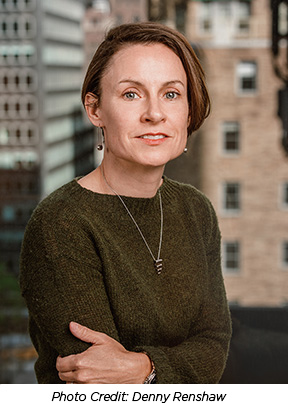
Anderson: Wow, what a beautiful argument for what we do and what we study. Thank you for that. Now, I know that you did an MFA. And after you left UT and you were doing some freelance writing. What is your favorite genre, as a writer?
Renshaw: My favorite to read, and certainly what I write, is micro fiction or minimalism. Many great writers of the genre feel the term “minimalism” is reductive terminology for very short fiction, which occasionally crosses from prose into poetry. It’s often difficult to tell a story in a paragraph or a few paragraphs. But gosh, it’s so impactful when it’s done well. And the story doesn’t quickly leave you.
Anderson: I think of that as both an aesthetic and a life skill, the way you’re describing it. This is the work of being human in community and communicating.
Renshaw: Art goes beyond what you feel when you’re reading a great story. It’s really about how you can communicate and connect with other people. And again, what I can’t say enough is that story drives to the meaning of being human or being alive. Humanness itself. It’s really a pleasure. Truly great stories help you see all the intersections between other people and your own life.
Anderson: Yes, yes, absolutely. There are always other characters in stories. So here’s the (as they used to say) $64,000 question: how does an English major become a real estate mogul?
Renshaw: Life doesn’t always lead where you think it will. I often say the job I have today did not exist when I was at UT, or for several years after I left UT. So I could never have said, Oh, I’m connecting the dots, and so now I’m going to be CEO of a tech enabled commercial real estate brokerage that sells this very niche type of commercial real estate around the country. I took my career one step at a time, and made the decisions that were right for me at the time. Those decisions led to where I am now.
At B+E we have a lot of interns and analysts who are fresh out of undergrad or graduate school. I often tell them just take your career decisions one at a time. You have to choose things that make money, for sure, but you need multiple forms of equity. As you make career choices, choose paths that provide you with relationships, skills, experiences, and some money. When you’re a young person, and especially if you don’t come from means, you might accidentally choose money more than you should, at least early on. And I’m not saying don’t advocate for yourself or anything like that. But the real equity that will multiply are our relationships, skills, and experiences.
So if you’re choosing those things, aligned with your passion, you kind of don’t know where you’re gonna end up, which was true for me. I wouldn’t have even known what it meant to be the CEO of a tech enabled commercial real estate company, you know? And even if I had been a business major, I still couldn’t have known what that meant because my current job didn’t exist yet. So it’s about being present and making choices. Again and again, finding the right path is more about aligning relationship, skills, and experiences with your passions.
Anderson: That’s beautiful. You know, I talk to many students these days, and I feel like they are looking at a world where the future of work itself is really hard to predict. You’ve given some great advice already. But from your point of view, as a thoughtful English major, who is now a CEO, what would you want young people to know about what you see about the future of work?
Renshaw: You’re making me think about the Studs Terkel book. What’s it called? Working. We’ve got hundreds of large container ships that are sitting outside of ports right now. They can’t get anywhere because a third of the truck drivers aren’t showing up, but the number one job in the country is being a driver. Many of the drivers (not all of them, but a lot of them) are deciding not to show up. I don’t believe they’re just doing nothing. Those people are doing something to follow their passion, I believe. They’re making other choices about what they enjoy doing. And it probably was enlightening to them around COVID, to realize that they would rather not be traveling.
I do think there’s a lot of potential disruption, but if you stick with your passion, and you’re really educating yourself about it, and staying valuable to other people who share your passion, I wouldn’t worry about your career path too much. I don’t want to sound cavalier. But if you love writing for newspapers, and that’s what you want to do, if print goes away, because circulation decreases, at the end of the day, what is it you love to do? What is it that you’re great at? You love to report on something. There’s some topic, and you’re able to articulate and communicate around that; that need hasn’t gone away. You just need to move into a different platform or medium. Are you doing it directly for an organization or a lobbyist or a politician? Who are you directly advising, because that’s really what a lot of our journalists do, right? They’re able to craft meaningful sentences, and that goes beyond just speech. That’s needed by a lot of organizations. It just might not be the Washington Post anymore. But if you stick with your passion, work hard, and have a line of sight to the true value of that work, what’s ever really changed?
In many ways, finding meaningful work is the primary catalyst to being alive. Aren’t we always trying to figure out what kind of work makes us feel most alive?
Anderson: You couldn’t have said it better. Because we’re in a moment where the university (which has always been about advancement, let’s be honest) has to be about finding a satisfying career and a better life.
Renshaw: You know, I’m fourth generation at the University of Tennessee. What was the name of the dorm? Was it Strong Hall? My grandmother was in the same dorm. And then I was there later. My dad went to UT, the Grad program for engineering, and my great-grandfather went there too.
Anderson: Right now we are working on a new approach to the English major in light of some of the STEM-heavy education that students have had so far, which we celebrate. But we’re finding new ways to fit in to their idea of what a college education is. We know that they’re hungry for our classes; they love them when they can get to them. Many feel that they can’t afford to major in English, but we have a host of alumni who beg to differ. So that’s part of why we’re doing these features, to give students the confidence that, yeah, they can do this from love, and they’ll be okay out there.
Renshaw: I have always said that undergrad is about learning how to think and communicate those ideas. Employers look for this above all else in candidates fresh out of college. For this reason, storytelling actually makes you vastly more employable and elastic across the economy as it changes.
